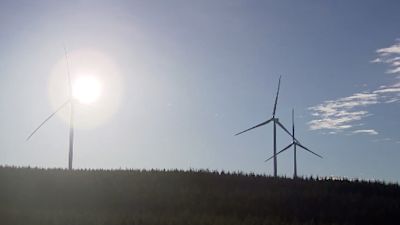COP26: The view from the ITV Border region

The COP26 summit is underway, with leaders from around the world gathering in Glasgow to discuss climate change.
Those attending have big aims - to try and achieve net zero greenhouse gas emissions by 2050 and limiting global warming to 1.5C above pre-industrial levels, protect natural habitats and communities, get developed countries to contribute more money to tackle the issue and encouraging international cooperation on the subject.
And it is not just in Glasgow where climate change is a big issue.
For many people in the ITV Border region, the environment is something they care about deeply and they will be looking on with deep interest at what happens at the summit.
The COP27 climate conference - what you need to know
What is COP27? When and where will it be?
What is COP27? When and where will it be?
Each year, the United Nations Framework Convention on Climate Change (UNFCCC) meets at what is called the Conference of the Parties (abbreviated as COP) to discuss the world's progress on climate change and how to tackle it.
COP27 is the 27th United Nations Climate Change Conference of the Parties summit which will be held in Sharm El Sheikh, Egypt from November 6-18.
Who is going?
Who is going?
Leaders of the 197 countries that signed the United Nations Framework Convention on Climate Change (UNFCCC) - a treaty that came into force in 1994 - are invited to the summit.
These are some of the world leaders that will be attending COP27:
UK Prime Minister Rishi Sunak is attending the conference, after initially saying he wouldn't as he was too busy focusing on the economy within his first weeks in office.
US President Joe Biden and his experienced climate envoy, John Kerry, will appear at the talks.
France President Emmanuel Macron will also be among the heads of state from around the world staying in Egypt.
King Charles III will not be attending COP27, despite being a staunch advocate for the environment. The decision was made jointly by Buckingham Palace and former prime minister Liz Truss.
Elsewhere, Russian President Vladimir Putin and his Chinese counterpart Xi Jinping will not attend the talks just as they decided to do for COP26.
What is it hoping to achieve?
What is it hoping to achieve?
1. Ensure full implementation of the Paris Agreement and putting negotiations into concrete actions - included within this is the target of limiting global warming to well below 2C.
2. Cementing progress on the critical workstreams of mitigation, adaptation, finance and loss and damage, while stepping up finance notably to tackle the impacts of climate change.
3. Enhancing the delivery of the principles of transparency and accountability throughout the UN Climate Change process.
Deal with plastic pollution and make of use natural resources
A team which protects and improves both sides of the Solway will be looking on with interest at what happens in Glasgow.
The Solway Firth Partnership want leaders to recognise the value natural materials can play when it compe to capturing carbon - particularly seagrass and salt marsh.
Georgie Reid, Solway Firth Partnership
They also say it is essential to deal with man-made problems, pointing out that volunteers regularly find themselves clearing large amount of plastic products from the beaches they look after.
Nic Coombey, Solway Firth Partnership
Agriculture's impact
One subject which isn't on the agenda at COP26 - perhaps surprisingly - is agriculture.
Globally, it has been estimated that food and land use contribute up to a third of greenhouse gas emissions. They also play a major role in deforestation, ecosystem change and the loss of biodiversity.
The National Farmers' Union chair for Dumfries and Galloway thinks this is a missed opportunity.
Colin Ferguson, a dairy farmer from the Kirkineer area, points out that most farmers are keen to play their part in tackling climate change.
Colin Ferguson, NFU Scotland, Dumfries & Galloway Chair
Experts and our region
Glasgow University’s Dumfries campus is preparing to host its own climate conference highlighting some of the work going on here
Carol Hill, University of Glasgow
Our Political Correspondent Tom Sheldrick has also sat down to interview Leo Hickman. He's the editor of Carbon Brief - a website that specialises in analysing climate change and they discussed issues like a proposed coal mine for west Cumbria, flooding and proposals for a new nuclear development at Moorside.